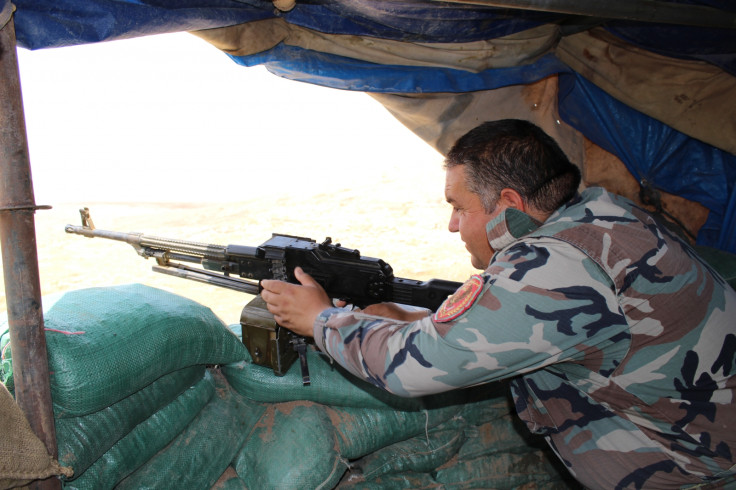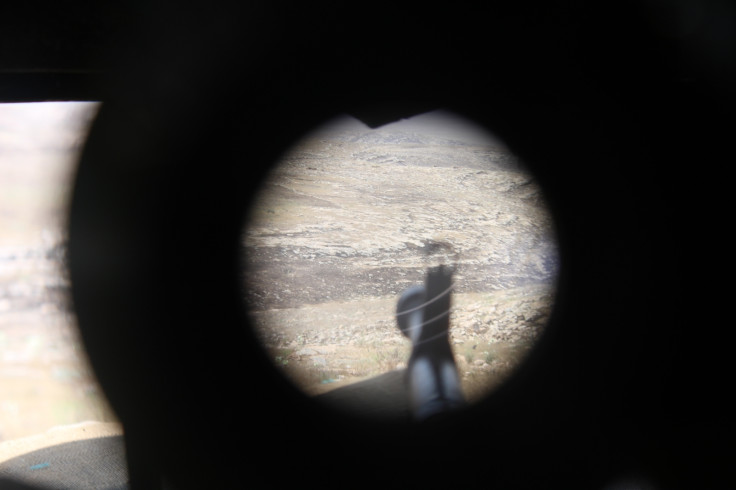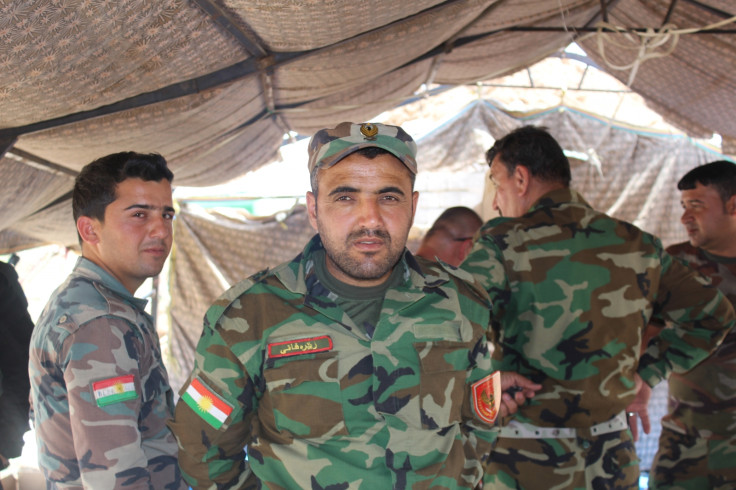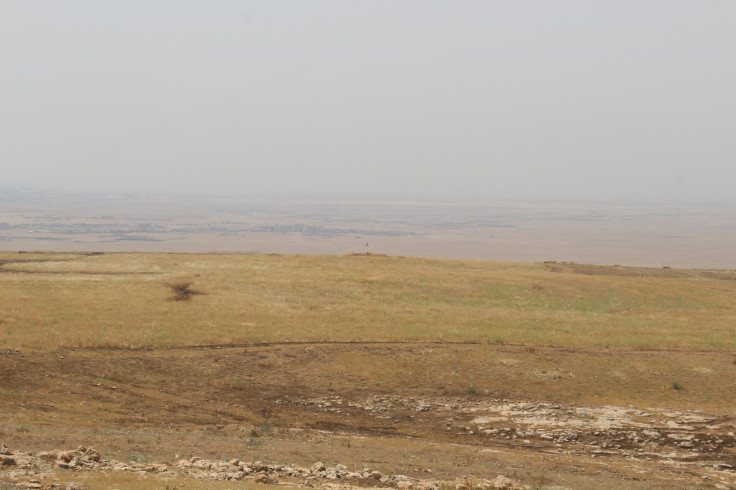Iraq: Kurdish fighters on Mosul frontline have Isis in their crosshairs

A dozen kilometres from Islamic State-held Mosul, a muffled thud barely draws the attention of the peshmerga troops standing behind a packed-earth barricade that marks the Kurdish front line - these grizzled fighters are more than used to the sound of explosions.
Seconds later comes the roar of the US A10 Thunderbolt making its getaway, veering upwards at an incredible rate of climb. The bomber had crept up on the IS positions unnoticed, and dropped its load just beyond the ridge that marks the beginning of the caliphate. Now, dark smoke billows into the clear sky.
The A-10 was once used in the US in these very hills against the forces of former dictator Saddam Hussein. It was almost retired last year but has found a new lease of life in northern Iraq, where the US has been striking IS positions to aid the Kurdish peshmerga forces.
There are no prisoners in this war.
The target today was likely a so-called vehicle-borne improvised explosive device (VBIED), usually a car packed with explosives which is driven directly at the Kurdish positions.
This tactic has been used across Iraq by IS, most recently in Ramadi, which the militant groups seized last week, fuelled by a seemingly endless supply of jihadists willing to die for the cause. IEDs in their various bloody forms have killed 70% of the 1,000 Kurds killed fighting IS so far.
Here on the front line near Mosul, they have been a menace.

But with IS heavily-committed in Ramadi, as well as in their battle for the Baiji refinery and Sinjar, the Mosul front has been comparatively calm. The city has been held by IS since the Iraqi army abandoned it in June last year, but the peshmerga - backed by US airstrikes - have managed to hold them back.
"It's been quiet for the last month. The Peshmerga have grown in strength, and Daesh have become weaker," says Ismat Rajab, the head of the ruling Kurdistan Democratic Party (KDP) in the area, and the de-facto commander of the sector, using the Arabic acronym for the Islamic State in Iraq and Syria (ISIS).
It seems a bold statement after the Islamic State's victory at Ramadi, which not only proved that the terrorist group is far from a spent force but also bolstered its arsenal with the military hardware left behind by the retreating Iraqi security forces.
Equally, although the peshmerga have been resilient in its defence of the lines near Mosul, they have yet to prove themselves as an attacking force. That will make the taking of Mosul - which the Kurds have vowed to play a role in - a tougher challenge when it finally gets underway.
And while US air cover has blunted the threat posed by VBIEDs (allowing for the nonchalance with which the peshmerga register the airstrike), the Kurds cannot always rely on the Americans. Only the night before, the platoon was forced to fend off another probing advance by IS fighters trying to infiltrate the outpost.

After a frantic gun battle, the insurgents withdrew, taking the bodies of their dead and leaving nothing behind but telling pools of blood in the stony mountain sand.
A week earlier, IS had driven an explosive-packed vehicle up the unpaved road a few hundred meters to the east of the outpost. A peshmerga fighter took the car out with a panzerfaust, a rocket propelled grenade launcher supplied to the Kurds by the German army.
If a person has no principle in his life, he is an animal. These people have no principles, they just want to kill
But instead of being cowed by the IS fighters' ruthless disregard for life - be it their own or that of their prisoners of war, which they routinely butcher - the peshmerga display a boisterous confidence.
The thirty-odd men have been stationed at the front for ten months, ever since the militia put an end to the advance of the Islamic State. They have dug in at the edge of a former airstrip, which they say was used by Saddam to travel to one of his many palaces that had been built nearby.
The earth rampart is framed by two simple bunkers at both ends, made from sandbags and a plastic roof. In the middle, a similar construction houses the Dushka, the Russian-made heavy machine gun that dominates the open ground in front of them. It is the first line of defence against the insurgents, and straddles a ridge that leads into a stony valley beneath.

The jihadists occupy the higher ground on the other side, its fortifications just visible to the naked eye. A black flag hoisted on a pole above the largest of the structures dotting the distant brow stakes a claim to the land behind.
The men are rotated in and out every week or so, allowing them to see their families and recuperate from front line duty. They wear a colourful array of different uniforms, and their Kalashnikov assault rifles vary greatly in age and condition, a reminder that they have to shoulder many of the costs of being here themselves.
But unlike the demoralised Iraqi army, the morale and sense of comradeship amongst the peshmerga is strong, and they claim the rudimentary living conditions and the proximity of death is no deterrent is a small price to pay to be with their comrades.
"When we go home, we miss being here," says Moyad, who mans the Dushka, the unit's heavy machine gun which dominates the valley below.
And instead of fear, they are dismissive of their opponents.
Two of them exploded when we shot them, one was wounded. When we went down later and reached him, we killed him
"If a person has no principle in his life, he is an animal. These people have no principles, they just want to kill," says Moyad.
Moyad has been given ample opportunity to return the favour. The tripod-mounted heavy machine gun is belt-fed its deadly 12.7mm calibre rounds from a large ammunition box attached to its left, it spits out spent cartridges on the other side. The ground is littered with cartridges, a testament to the gun's healthy appetite.
Moyad's grudge against the Islamic State is not just borne out of Kurdish patriotism; it is personal. A former Mosul resident, he had to leave the city for Kurdistan even before IS took the city by storm, after receiving repeated death threats from the group's supporters.
He is an experienced fighter, having been part of the Iraqi government forces that fought alongside the US Marines in the bloody battle to flush Al Qaeda out of the city of Fallujah in 2004. He still carries a scar on his left leg from an injury sustained from a car bomb.
While he speaks, a small group of his comrades listen in on the enemy. Stood on the rampart, one Peshmerga holds a walkie-talkie tuned into IS frequency; a frequent chatter emerges from the device.

One jihadi asks about the water supply, other messages are obscured by simple code. Through the airwaves, these members of the world's most reviled terror organisation sound mundane, and nothing like the fearsome warriors of the Islamic State's sophisticated internet propaganda.
Apart from the airstrike, and a short burst of machine gun fire from a nearby position, there are few indications of active warfare. The peshmerga spend much of their time under a large canopy that is flanked by flat building and a huge pile of earth that conceals a concrete bunker to protect against mortar fire.
The troops eat, rest and sleep under the canopy, and much of their equipment lies scattered between their blankets: Kalashnikovs, combat vests laden with ammo clips, a dagger, a pair of handcuffs. A dirty pan with the remains of their last meal, a kettle that much of the day is spent drinking tea.
It is the nights that are dangerous. IS prefers to mounts its attacks under the cover of darkness, and the night watch has to be alert. In the heaviest attack so far, three suicide bombers were shot before they were able to blow themselves up.
"Two of them exploded when we shot them, one was wounded. When we went down later and reached him, we killed him," says Rawan, a lanky peshmerga wearing a black beanie.
The men are in no mood to take risks against opponents that use suicide as a weapon or to show mercy on those dying to kill. Nayaz, our KDP interpreter, chimes in: "There are no prisoners in this war."
Florian Neuhof is a freelance journalist currently based in Erbil, northern Iraq.
© Copyright IBTimes 2025. All rights reserved.






















